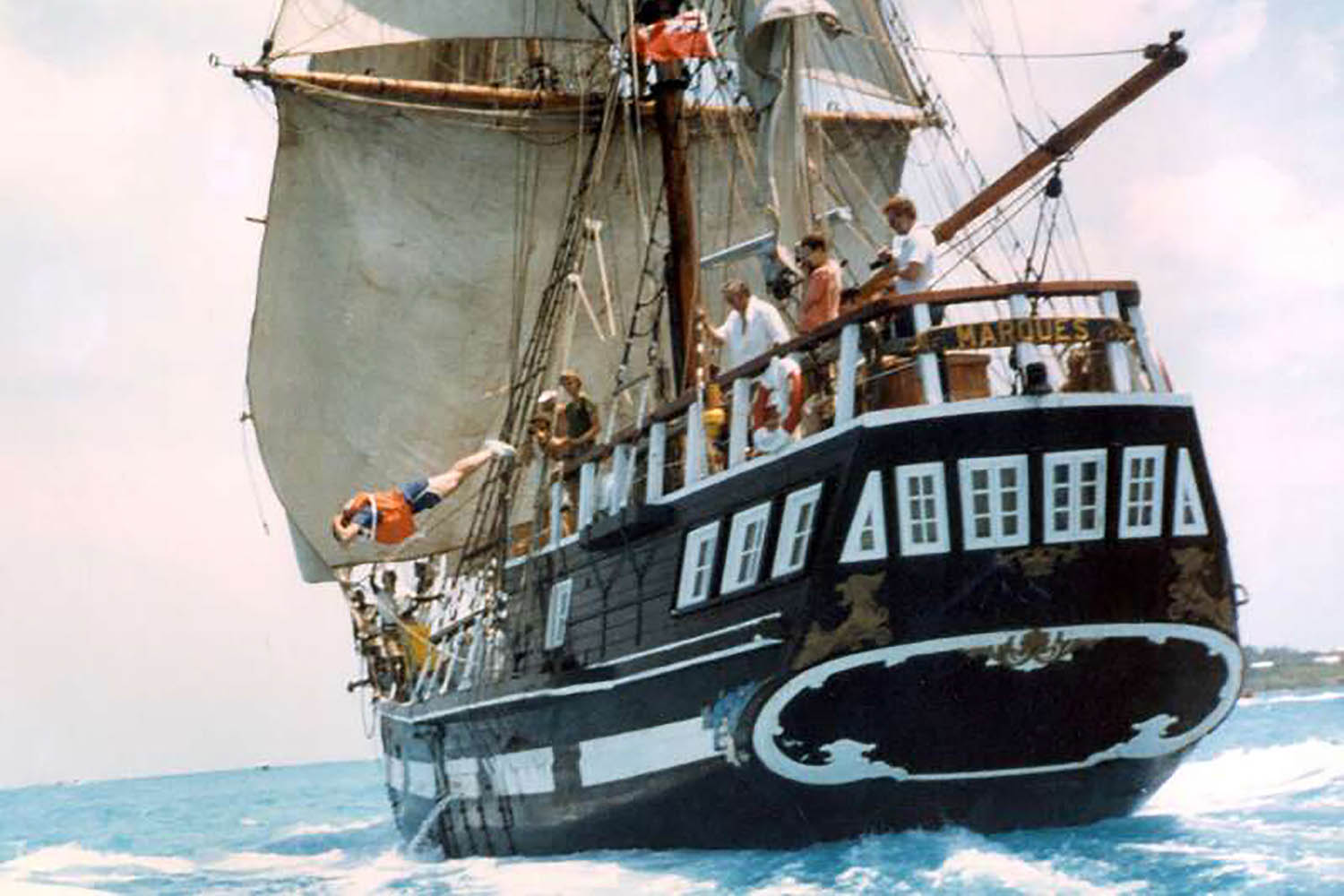The picture tells the story. As the Marques, a tall ship familiar to British television viewers from period dramas such as The Onedin Line and Poldark, leaves Hamilton harbour in Bermuda amid blaring horns and a flotilla of well-wishers, a figure can be seen diving overboard. A cluster of onlookers, mostly young sailors, are watching as Ann Spurling, a local photographer, plunges into the choppy waters. She will soon be picked up. Thirteen hours later, most of those she has left on deck will be dead.
Two nights earlier, a friend and I had pulled over on Bermuda’s beautiful, panoramic Harbour Road and looked across the water towards Front Street. Our eyes had been drawn to some of the spectacular fleet lying at anchor, and especially to the Marques, winner of the first leg of the Cutty Sark Tall Ships Race. It was June 1984. I was working as a reporter and, like the rest of the island, was entranced by these regal and romantic visitors: 39 classic tall ships, largely crewed by trainee sailors from all over the world, under the guidance of professional skippers.
Even in early summer, Bermuda can be hot. But that evening was cool, the sky above cloudy, so we were in rain gear. Such conditions often portend storms around this tiny island, 600 miles from the nearest land mass, and although there was some talk that the start of the race might have to be delayed, there was nothing ominous in the scene before us.
By the time we arrived in town, the waterfront bars were crowded with locals and tourists, there to see the tall ships. Some of the sailors who would shortly be setting off on the Bermuda to Halifax leg of the race were also enjoying perhaps their last night ashore.
The following day, the island was buffeted by severe winds. But by evening, conditions were calmer, and as race day dawned the weather had improved enough for the ships to set off. But soon there were reports that beyond Bermuda’s safe harbour some of the ships were struggling in heavy seas and winds as high as 40 knots.
In the early hours, disaster struck. According to survivors – the only witnesses – a rogue wave engulfed the Marques. As all hands tried to scramble on deck, water poured through the open main hatch. The 67-year-old barque went down in less than two minutes.
Of the 28 souls aboard, only nine survived. In a ghastly twist, it turned out that the skipper, Stuart Finlay, had smuggled his wife, Aloma, and 15-month-old baby son, Christopher, aboard. They too were lost.
‘When I looked back to where the ship had been, there was nothing, nothing at all’
‘When I looked back to where the ship had been, there was nothing, nothing at all’
One of those who did survive, Bobby Cooper from Scotland, 19 at the time, is quoted at length in a new book about the disaster by Shirley Cooklin.
“All of a sudden, without any warning, the ship began to keel over … suddenly she was down in the water with her mast and sails lying flat … I found myself tangled up in the rigging. She was sinking fast. Then I was down in the saloon and all the lights were on, as if they were having a party. I thought I must be dead,” he recalled. He found his way to the surface and a life raft. “When I looked back to where the ship had been, there was nothing, nothing at all.”
Cooper’s emotional account was all the more terrible for Cooklin. Her son, Ben Bryant, 18, was one of those who did not survive. His picture, taken by Spurling aboard the Marques moments before it left harbour, adorns the rear of the book.
Newsletters
Choose the newsletters you want to receive
View more
For information about how The Observer protects your data, read our Privacy Policy
Cooklin (a writer and actor of some distinction herself) is now 95, but the terrible pain of losing her son more than 40 years ago seeps from every page. Her book, as well as featuring famous friends such as Beryl Bainbridge and Joan Bakewell, also rages at various authorities including Margaret Thatcher and her transport minister Nicholas Ridley, and its subtitle – “A tragedy at sea. A cover-up. One mother’s search for justice” – conveys that frustrated fury. There were indeed questions about the seaworthiness of the ship (it had often been adapted for television appearances), the size of the main hatch (which had been increased for the same reason), and of course whether the race should have started when it did.
But the abiding impression her book leaves is one of the enduring misery of grief. Four decades have not diminished Cooklin’s sorrow for her lost boy.
Five days after we had watched those tall masts silhouetted against the twinkling evening lights of Front Street, I found myself on a dock, this time watching a single ship sail silently into the dawn gloom of Bermuda’s other harbour in St George’s. The Zawisza Czarny, which had left amid such fanfare and hope with the Marques, had returned, carrying the survivors.
Blame Not the Wind by Shirley Cooklin is published by HarperElement (£22). Order a copy from The Observer Shop for £19.80. Delivery charges may apply
Editor’s note: our recommendations are chosen independently by our journalists. The Observer may earn a small commission if a reader clicks a link and purchases a recommended product. This revenue helps support Observer journalism
Photography by Royal Gazette, Bermuda

